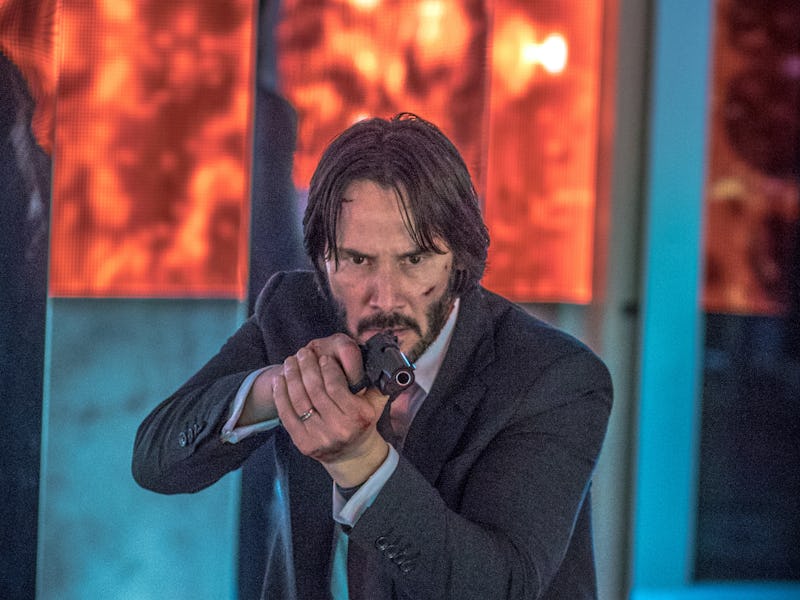John Wick Suffers Extreme Workplace Rage, Psychologist Says
“You harmed me. That was wrong. I observed it, and now you're going to pay for it.”

Revenge is a dish best served cold, and John Wick has an ice cold touch. In both Keanu Reeves revenge films, Wick keeps getting pulled back into an underground world of organized crime despite his desires to live a normal life. This internal tug of war is at the core of Wick’s convictions, but it’s also at the root of the people who seek different kinds of revenge every day.
“People want to teach somebody a lesson,” Thomas Tripp, a professor in the department of psychology at Washington State University, told Inverse. “If we don’t believe we’ve taught someone a lesson, we don’t enjoy the revenge, and it’s extremely difficult for other people to learn lessons.”
Tripp’s research deals with workplace revenge. Though Reeves’s hitman problems in John Wick probably seems like the furthest thing from white-collar squabbles, Tripp’s research and the overblown action-adventure have a surprising amount in common.
Three Types of Revenge
Tripp broke down revenge-seeking into three main categories. One is simple goal obstruction, or when someone gets in your way when you’re trying to achieve something. The second is when we don’t like people who break the rules and get away with it. The last is that people seek revenge when they feel their reputation is sullied. Wick’s relationship to revenge leans particularly into the latter categories throughout both films.
Iosef Tarasov crossed a line in the first movie when he kills Wick’s dog, destroys his house, and steals his car. And he’s reminded of that mistake over and over again. “It’s not what you did, son, that angers me so. It’s who you did it to,” Viggo Tarasov tells his son. “Who? That fucking nobody?” the son responds. “That ‘fucking nobody’ is John Wick,” Viggo shoots back. In the sequel, Wick is forced into a job he doesn’t want because he entered into a verbal agreement, which his associate Santino D’Antonio uses for his own personal gain.
Wick’s reputation preceded him precisely because he is so efficient in achieving his workplace goals, and he chooses to seek revenge because his opponents have broken rules. “People treat us these particular ways, and we want to rectify it,” Tripp said. “It’s all about justice: You harmed me. That was wrong, I observed it, and now you’re going to pay for it.”
Personal Stakes and the Wild West
“Walking away is a way to get even as well,” Tripp said, “but the general emotional response is one of anger and moral outrage.”
Wick wants to walk away from organized crime and care for his dog after his wife falls ill and dies. The dog is killed, and what remains of his new life is shattered, forcing Wick into revenge mode. The same emotional stakes are what compels Wick into his mission in the sequel. He wants to walk away as he did in the first movie, but a rival intimidates him into the very thing he doesn’t want to do anymore.
“At that point, you decide whether or not to become an avenger,” Tripp said. “If I believe my organization is a fair place to work, the powers that be will go ahead and punish the person appropriately. I don’t need to seek revenge … In places where there’s little perceived fairness, people are much more likely to take matters into their own hands.”
Tripp equated workplace revenge and Wick’s revenge to something like the wild west. “If people can’t turn grievances over to the system itself, then they face the question of whether they should do something about it themselves.”
Workplace Hazards
For all this talk of vengeance, Tripp reiterated that his research didn’t yield glorified types of fictional revenge like in John Wick. “It’s too unpredictable,” he said, citing a person suing their workplace as the most extreme example of revenge in his research. “Revenge is about justice, but it’s a very sloppy form of justice.”
A person seeking revenge doesn’t know how much damage will be caused, but that still seems to be Wick’s problem at the end of Chapter 2. He let his sense of outrage get him in hot water following his actions in both movies.
Wick is perhaps the best assassin in the world. Mob peon Iosef Tarasov may have greater social standing because he’s the son of an organized crime kingpin, but he’s basically Wick’s social subordinate. Wick doesn’t hesitate to get revenge. D’Antonio, on the other hand, is tied to the larger occupational structure of what is known in the John Wick universe as the High Table, a kind of assassin’s senate. Wick can’t not adhere to the rules and regulations of the blood oath of the High Table, and he is impelled to return D’Antonio’s favor because of it.
But Tripp made a caveat. “If you’re a company officer, then you shouldn’t do things unbecoming of being in that position,” he said. “Employees expect better.” This, in turn, is why Wick chooses to fight back against D’Antonio in Chapter 2. “But if I attack,” he added, “the problem is what the retaliation against me will be.”
At least we know we have that to look forward to in John Wick 3.